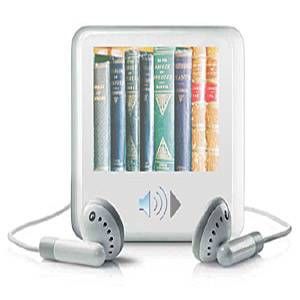
Biting the Bullet: Embracing Audiobooks
I like to listen to music at work.
I have a very task-related job, so I like having something there to help time move a little faster.
But eventually, you get tired of streaming radio, even when you can customize the channels.
You get tired of trying to think up choral masterworks to search for Leonard Bernstein conducting on Youtube.
I’d always avoided audiobooks due to fear of missing information. When I listen to music in the car, or at work, I can go whole songs without noticing. But after a few weeks of music for eight hours a day, I needed to change it up. So, I went on my library’s Overdrive site and considered my options.
The first thing I had to think about was what I could listen to. After thinking about my own listening habits (mostly from how I “watch” television) and suggestions from coworkers, I got a bit of an idea about what I might be able to truly listen to, instead of just hear.
It turns out, for me, that audiobooks are a great way to get through The Hard Stuff- more distinctly, nonfiction. I’ve often found myself reading several pages of a heavy nonfiction tome and only remembering a few words; I’ve always been more of an aural learner anyway, so something that doesn’t have a forward-moving plot like the novels I prefer might just be consumed better by voice.
Like listening to a really long documentary on the History Channel.
Once I figured out what I would be listening to, I had to think about my particular situation. Now that I had sucked it up and decided to listen to audiobooks, would I listen to them anywhere besides work? I know some people like to listen to audiobooks while they’re commuting or doing housework. For me, they are the opposite of written work. I can read and watch television at the same time, or listen to music, and even manage to sing along while still following the progression of the story. But even a sentence in the audiobook will make me think of something else and miss full minutes of the text–thank goodness for that back step button. If someone around me is talking loud enough for me to hear bits of the conversation? Gone. I won’t have been able to catch every word, or even every three words, thus losing a great deal of context. Out in the world, other things often catch my attention when I’m on a walk or having lunch in the food court. What can I say? I’m nosy easily distracted.
So a quiet environment, where little else is going on, and in which I am not doing anything that requires any form of higher thought process, is really the only place I can listen to an audiobook. Which takes out short drives (and long drives, too, unless I’m driving through Texas or Indiana or some other place with long, straight roads), walking to work on busy sidewalks, and sitting in my living room while my husband is there.
Which pretty much just means work is the only place I can listen to audiobooks.
Great! What other requirements do I have?
One thing I discovered two books into this newly-turned leaf is that I am so not a fan of voice-acted audiobooks. I’d thought, since I would not be listening to anything with true “characters”, that I would be able to escape such a phenomenon.
Not the case.
Sometimes, I have learned, when a narrator is quoting a document or interview, they will change their voice a little bit. That’s cool, they’re distinguishing their voice from that of the person they are quoting. Sometimes, though, they will change their voice to the point of ridiculousness. A baritone-voiced man should not imitate a woman or child. Ever. And they should also not try to sound so much like the person they are quoting that the mimicry takes away from the quality of the narrative. The first time I heard such a thing, it was jarring. As the practice continued, it devolved into just being annoying.
Apparently, people have differing thoughts about this; otherwise, I would not be suffering from this affliction.
Thankfully, it has only happened the once so far; the book I listened to following it actually delighted me with actual sound-clips from the PBS documentary to which the book was a companion. Since then, I have been blessed with books read by their authors, in which they stick to what they know: reading aloud for grown-ups.
Not everyone will embrace audiobooks the way I have, or come to the conclusions I have about my own reading. Some people think audiobooks “don’t count” or just have too much activity in their lives to stop and listen to one. I will probably lose my chance if I change to a different style of work.
But hey, for now, at least I get to learn things.


